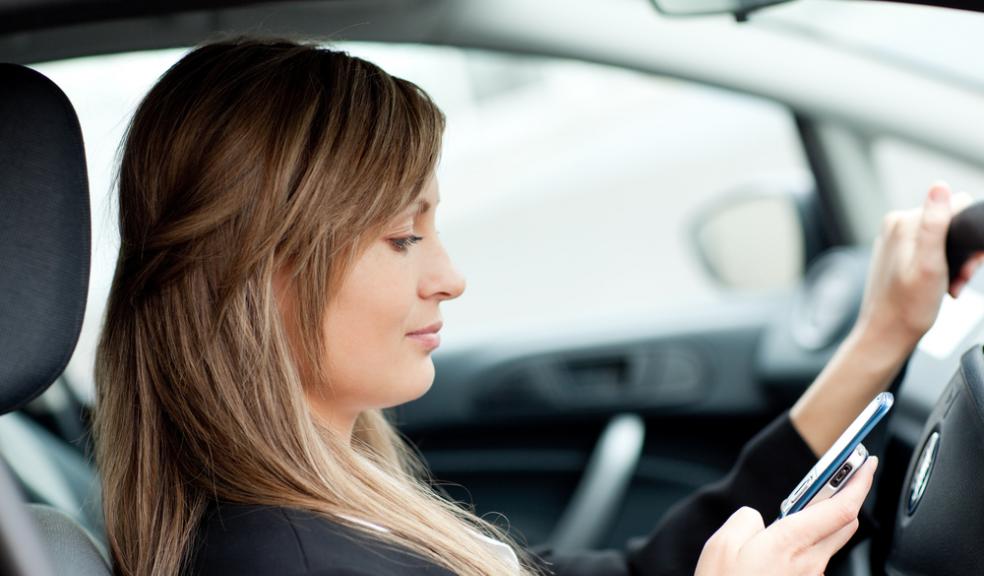
Brake campaign appeals to drivers to tune in to road safety and turn off their phones
A national campaign launched yesterday (18 November) by the charity Brake at the start of Road Safety Week calls on drivers to tune in to road safety, to prevent appalling crashes caused by multi-tasking at the wheel.
The campaign appeals to drivers to turn off their phones or put them in the boot, and urges everyone to refuse to speak on the phone to someone who’s driving. It is being launched a decade after hand-held mobiles were banned at the wheel, and coincides with a week-long enforcement campaign.
Brake, and partners Specsavers and Romex, are revealing statistics confirming the extent of driver distraction on UK roads, and its impact on vulnerable road users:
- More than half a million UK drivers (575,000) have points on their licence for using their mobile phone at the wheel or being otherwise distracted. One in 15 (6.5%) of these drivers have six points or more for driving distracted and four in five (78%) are male
- Six in ten children (62%) report being driven by a driver talking on a phone and nearly eight in 10 (79%) have spotted drivers on mobile phones outside their school or home – suggesting the majority of children are being endangered by drivers for the sake of a call or text.
The campaign is being supported by the Association of Chief Police Officers, who are coordinating a week-long campaign of heightened police enforcement across the country targeting drivers on hand-held phones.
Distraction reduces hazard perception and increases reaction times in a similar way to drink-driving, making drivers much more likely to cause deaths and injuries. Drivers who think they can multi-task are fooling themselves: research shows 98% are unable to divide their time without it affecting performance. Talking on a phone hand-held or hands free, texting, emailing, adjusting sat navs, eating, drinking and smoking are all proven to increase crash risk. More facts about driver distraction below.
New research by distraction expert Dr Amy Guo at Newcastle University highlights the increased risk of turning your car into an extension of the office. It shows the harder you have to concentrate on a task, such as dealing with work-related calls, the slower your reactions. This demonstrates why talking on hands-free is just as risky as hand-held, because it’s concentrating on the conversation that’s the main distraction.
The tune in to road safety campaign is being launched in Road Safety Week by events and demonstrations in schools, universities and town centres across the UK, highlighting the dangers of taking your eyes, hands or mind off the road (see below). It is being supported by families who have suffered the horror of a bereavement or serious injury in a distracted driving crash and want to speak out.
Julie Townsend, deputy chief executive, Brake, the road safety charity, said: “We’re living in an age when being constantly connected is the norm; more and more of us have smartphones, and find it hard to switch off, even for a minute. While there are enormous benefits to this new technology, it’s also posing dangerous temptations to drivers to divert their concentration away from the critical task at hand, often putting our most vulnerable road users in danger.
"Many people who wouldn't dream of drink-driving are succumbing to using their phone and other distractions while driving, oblivious that the effect can be similar and the consequences just as horrific. We’re calling on UK drivers to tune into road safety: turn off your phone or put it in the boot, and never try to multi-task at the wheel. We’re also appealing to everyone to refuse to chat to someone on the phone who’s driving, to help them arrive safely.
“We are also calling on government to do more to tackle driver distraction, by extending the ban to hands-free phones at the wheel, and further upping fines for the potentially deadly offence of driving distracted."
Road Safety Minister Robert Goodwill said: “The UK has one of the best road safety records in the world and improving this record remains a top priority for the Government. That is why we have increased fines for using a mobile at the wheel, made it easier for the police to tackle bad driving behaviour and we are looking at how we can improve young driver safety. I welcome Brake’s Road Safety Week initiative which helps raises awareness of the importance of road safety.”
National Policing Lead for Roads Policing, Chief Constable Suzette Davenport, said: “As technology has advanced, we’ve seen a change in the behaviour of some drivers who are allowing themselves to become distracted and putting themselves and others at risk.
"While a phone call may be important for a few minutes, killing or seriously injuring someone has life changing consequences. While most road users are careful, considerate and law-abiding; a minority are not.
"Too many collisions are caused each year by those who use excessive speed, drive without a seatbelt, drink or drug drive, or are distracted at the wheel. Enforcement and awareness schemes are being carried out by police across the country as part of Road Safety Week, which is an ideal time for drivers to remember the dangers they can face, alongside an opportunity for forces to apprehend those who flout traffic laws.”
Facts on driver distraction:
Driving is the most dangerous thing most of us do on a regular basis: you're operating a potentially dangerous machine in an unpredictable, public environment so it requires full concentration at all times.
In the United States, death from distracted driving has been increasing and researchers put this down to increases in drivers using smart technology. In the UK Ofcom has warned of increasing levels of smartphone addiction by users who are unable to go without checking their phone for short periods or through the night.
It is believed around one in five crashes could be caused, at least in part, by driver distraction and drivers who perform a secondary task at the wheel are two to three times as likely to crash. Some very complex tasks, like talking on a phone, whether hand-held or hands-free, increase this risk even more.
The effect of talking on a phone on driving has been shown to be worse than drinking certain levels of alcohol. Driver reaction times are 30% slower while using a hands-free phone than driving with a blood alcohol level of 80mg alcohol per 100ml blood (the current UK limit) and nearly 50% slower than driving normally and soberly.
Other forms of distraction not involving technology also cause risk. If you're eating or drinking at the wheel, you are less able to react; some studies have suggested the risk is as great as when talking on a phone.
Heightened emotions such as stress, anger or upset are cognitive distractions that significantly impede your ability to drive safely. The level of distraction depends on the level of distress.
Drivers caught using a hand-held phone at the wheel to call or text face a (recently increased) fixed penalty notice of £100 and three points, or may be offered a course instead of taking points. In 2012, more than 10,000 drivers caught using their phone at the wheel took a ‘what’s driving us’ course, instead of opting for points. In some cases drivers may go to court and face disqualification and maximum fine of £1,000. Drivers who cause a crash and kill someone while using a phone could face up to 14 years in prison, as well as the knowledge that someone died because of their decision to use their phone at the wheel.













